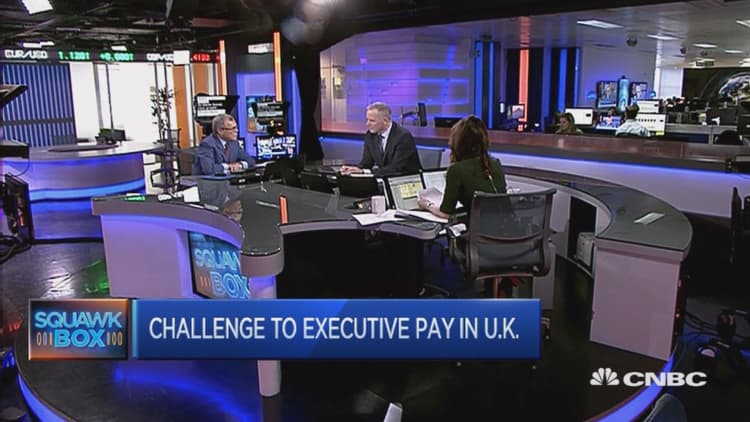
Top executives at U.K. blue-chip companies are still raking in significant pay rises, despite muted earnings growth and increased shareholder activism.
The figures for 2015 suggest that the average pay for chief executives has been skewed by a few large increases. Median pay for FTSE 100 chief executives was only up by 2 percent to £3.973 million ($5.2 million) in 2015, according to research by the High Pay Centre.
Sir Martin Sorrell, the founder of advertising giant WPP, topped the high pay league with a £70 million pay packet which sparked a significant protest by shareholders. Tony Pidgeley of property firm Berkeley Group, with £23 million, was a distant second.
Executive pay - the top 5 in the FTSE
- Sir Martin Sorrell, CEO of WPP £70.416m
- Tony Pidgeley, CEO of Berkeley Group £23.296m
- Rakesh Kapoor, CEO of Reckitt Benckiser £23.190m
- Jeremy Darroch, CEO of Sky £16.889m
- Flemming Ornskov, CEO of Shire £14.638m
The chief executives of FTSE 100 companies were paid £5.48 million on average in 2015, 10 percent higher than in 2014. This figure represented close to 130 times the average pay of their employees, a figure which will add fuel to the growing fire around executive pay in the country.
Whether the pay rises can keep coming after dampened earnings expectations in 2016 -- plus a new U.K. Prime Minister who has vowed to tackle what she called the "unhealthy and growing gap" between pay for bosses and workers -- remains to be seen.
"There is apparently no end yet in sight to the rise and rise of FTSE100 CEO pay packages. In spite of the occasional flurry from more active shareholders, boards continue to award ever larger amounts of pay to their most senior executives," Stefan Stern, director of the High Pay Centre, said in a statement.
Theresa May, the longstanding Home Secretary who became Prime Minister in July after the vote by the U.K. to leave the European Union surprised the country's political establishment, pledged during her campaign to put workers on the boards of companies and tackle perceived excesses in boardroom pay.

